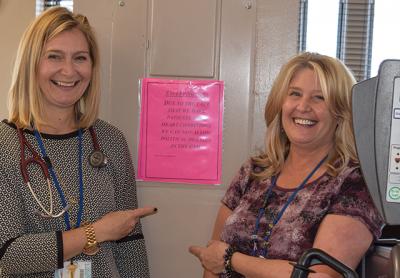Keep Calm and Leave Political Rancor at the Door

With less than two weeks until Election Day, tensions are running high. Discourse over who should be the 45th president of the United States has reached such a fevered pitch that political debates in Southampton Hospital’s cardiopulmonary rehabilitation gym have been banned because of the stress they can cause patients.
Located in the Ed and Phyllis Davis Wellness Institute, the rehab center monitors, on an out-patient basis, people who have undergone heart surgeries or been diagnosed with heart disease through a comprehensive lifestyle modification program. In groups of as many as 20 patients exercise under the care of nurses certified in cardiovascular health, exercise physiologists, and respiratory therapists. Several televisions are usually tuned to CNN or Fox News as a distraction while people use a treadmill or lift weights. Political banter is not unusual.
However, discourse has reached new heights, according to Jessica R. Swiatocha, the manager of cardiopulmonary rehab and wellness services, who has been working there for 15 years. “We were getting a lot of complaints from patients who didn’t want to listen to the debates.” With her colleagues, she decided to post a “safety notice” outlawing spirited discussions. “Due to the fact that we have patients with heart conditions we cannot allow political debates in the gym,” it reads in all capital letters on hot-pink signs.
People were raising their voices and making their opposing views known to the entire room filled with fellow patients who had no choice but to listen, Ms. Swiatocha said. She recalled how one woman walking on a treadmill between two older men was literally caught in the middle while a Trump supporter on one side and a Clinton supporter on the other were embroiled in a lively back-and-forth.
Another time a Hillary Clinton supporter brought one of her books to a Trump supporter, faking Clinton’s signature in it as a joke. The book ended up on the floor and bystanders — who did not know that the two had been engaged in a friendly, ongoing banter — were disturbed.
While amusing to recall, the tensions can also have some serious health ramifications, especially for those who have cardiac problems. Stress can elevate blood pressure and heart rates, increase cortisol level, which makes it harder to lose weight, and increase anxiety and depression, said Ms. Swiatocha, a nurse practitioner. “Stress can exacerbate chronic disease,” such as diabetes or chronic obstructive pulmonary disease.
The American Psychological Association reported that over half of American adults find the 2016 election a “very or somewhat significant source of stress.” The association recommended that those for whom the 24-hour news cycle is causing stress should limit media consumption and read only enough to stay informed. “Avoid getting into discussions about the election if you think they have the potential to escalate to conflict,” the association said.
The wellness center preaches stress management, and teaches its cardiac rehab patients how to handle stress through meditation or relaxing breathing. Sometimes, the best thing someone can do is just walk away from a conversation if it is causing too much anxiety, Ms. Swiatocha said. In a class setting that is not always possible, so she felt it was best to urge people to avoid spirited debate altogether. Discussion of politics is fine, and the TVs are still set to news channels, but “it can’t get too heated,” she said.
The signs have been up for about a month, and there have been no incidents since. Ms. Swiatocha said some patients who were dismayed by all the political disagreements have even thanked her, telling her they were “so stressed out” before.
Not everyone heeds the sign, of course. “I had to speak with a couple of people,” she said with a laugh. “Perhaps you missed my sign,” she would say to them. Some told her they thought it was a joke, so she has had to explain her reasoning. Ms. Swiatocha expects the signs to come down after Nov. 8, assuming political tensions are resolved on Election Day.
